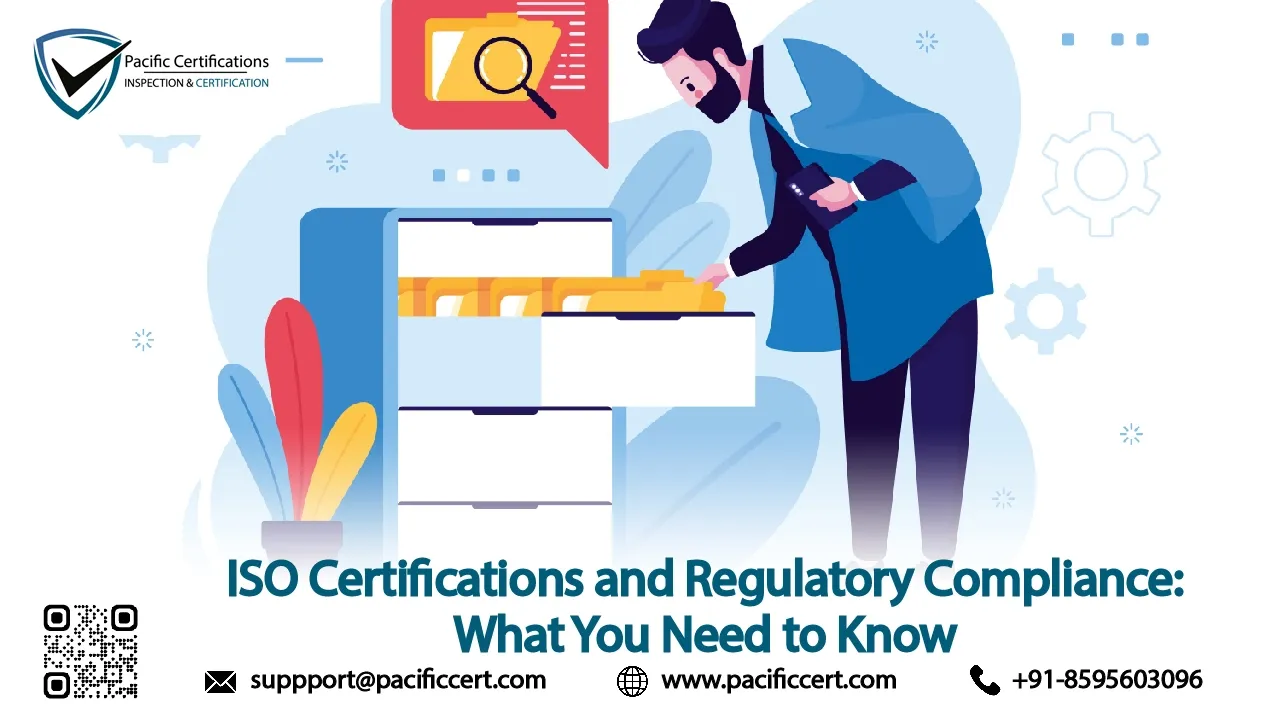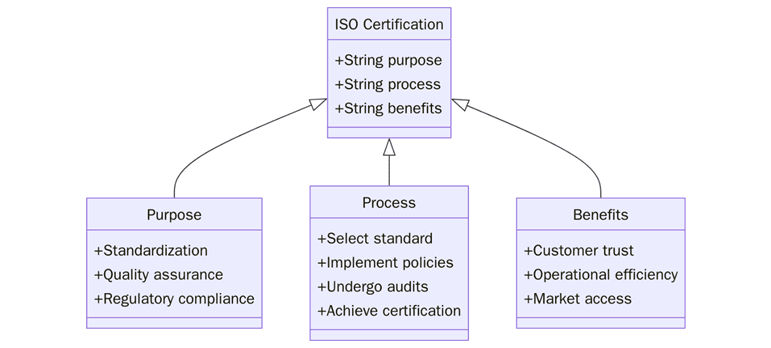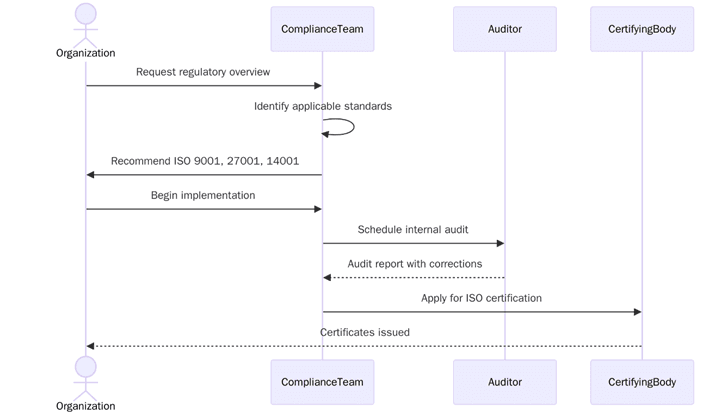ISO Certifications and Regulatory Compliance: What You Need to Know

In the current climate of global business, being regulatory compliant is a legal obligation, but it is also critical to maintaining credibility, avoiding penalties and keeping business running smoothly. ISO certification is one of the best ways a business can prove its compliance- standards set by the ISO (International Organization for Standardization) are global accepted standards that allow organizations to adapt regulations to their operations, while simultaneously enhancing efficiency, quality and customer trust. In this blog, we will outline how ISO certifications can help show regulatory compliance, as well as explain why regulation compliance is a requirement for doing business nowadays.
For assistance, contact us at [email protected].
What is ISO Certification?
ISO certification is a process of evaluation by an independent, accredited third-party certification body; the processes, practices, and/or products being provided comply with an ISO standard. ISO standards are internationally recognized benchmark standards covering a wide variety of fields such as quality assurance, environmental responsibility, security of information and occupational health and safety.

ISO certification shows that an organization is committed to meeting international standards with respect to quality, safety, and sustainability. ISO certification is achieved after a third-party audit of the organization’s systems excluding any additional assurance on any product. ISO certification is external assurance that confirms that the organization complies with its stated ISO standard.
How ISO Certifications Help With Regulatory Compliance?
ISO certifications are meant to help organizations improve their internal processes and meet specific regulatory requirements. By paying attention to ISO standards, businesses will be able to tackle the challenge of regulatory compliance in different industries proactively. Here's how ISO certifications assist businesses in maintaining compliance:
Improving Internal Processes to Meet Regulatory Requirements
ISO standards are based on internationally accepted principles of best practices. For example, ISO 9001 promotes quality management and has specified requirements on process improvements, documentation, and compliance. When a business adopts these standards, it has a higher probability of meeting the regulations and statutory compliance obligations that exist to oversee an industry's quality, customer satisfaction and operation practices.
Using the pharmaceutical industry as an example, there are numerous regulations that a business must comply with to prove that the products made safe and meet quality standard regulations. One example is ISO 13485 which is the quality management system standard for medical devices.
Enhancing Environmental Compliance
ISO 14001 provides a strong support system for organizations hoping to improve their environmental practices and comply with environmental regulations. This community-based standard outlines a way for businesses to implement an Environmental Management System (EMS) that can reduce their impact on the environment and comply with local and International environmental regulations. Each organization that adopts ISO 14001 can take charge of how company resources are consumed, waste is disposed, and how it will minimize its environmental impact while also complying with the legal requirements in the region or industry it operates.
The ISO 14001 standard can also assist organizations with the many regulatory compliance requirements arising from various environmental regulations such as the EU Waste Framework Directive and its local environment laws.
Ensuring Data Protection and Privacy Compliance
Data security is becoming a greater concern for businesses and regulators. Businesses need to comply with laws like the General Data Regulation (GDPR) in the European Union or various regional data privacy regulations. ISO/IEC 27001 pertains to information security management and identifies a systematic approach around securing sensitive data while ensuring the organization is complying with privacy requirements.
Organizations using ISO/IEC 27001 are able to develop information security management systems to protect customer data, comply with privacy laws and reduce the risks for security breaches. ISO/IEC 27001 provides organizations a clear set of guidelines around managing information security risks and ultimately shows compliance with the privacy regulations that will protect your business from data breaches in a data-centric economy.
For assistance, contact us at [email protected].
Key ISO Certifications for Regulatory Compliance
Different ISO standards focus on various aspects of business operations, helping organizations meet specific regulatory requirements. Below are some of the key ISO certifications that play a vital role in regulatory compliance:

ISO 9001: Quality Management System
ISO 9001 is the most well-known of all ISO certification’s related to quality management systems. ISO 9001 addresses quality management processes to ensure that your organization’s products and services meets customer expectations and regulatory requirements. ISO 9001 enables your organization to focus on streamlining processes, improving operational efficiency, and meeting compliance requirements across many industries.
ISO 14001: Environmental Management System
ISO 14001 is dedicated to environmental management, which involves compliance with local, regional, and national environmental laws and regulations. This standard assists organizations in minimizing their environmental impact through improved environmental performance and resource management.
ISO/IEC 27001: Information Security Management
ISO/IEC 27001 provides guidelines for creating an Information Security Management System (ISMS). This accreditation is important for businesses that require compliance with data protection laws, manage security risks, and ensure the protection of sensitive information.
ISO 45001: Occupational Health & Safety Management System
ISO 45001 can help your organization improve workplace health and safety. It is a way to identify potential risks, prevent workplace injuries, and comply with health and safety legislation.
The Impact of ISO Certification on Compliance
ISO certification provides numerous benefits for organizations working to meet regulatory compliance. Some of the key impacts of ISO certification on compliance include:
1. Businesses must navigate complex regulatory requirements, but ISO standards provide a proven approach to simplifying compliance. By following ISO standards, businesses can simplify compliance and improve business practices.
2. Certification to ISO standards is an assurance that the organization will perform consistent activities that reduce non-compliance with industry regulations. Regular audits and assessments ensure that non-compliance gaps can be identified and an effective corrective action process can address the issue.
3. certification provides an organization with proof to customers, regulators and stakeholders of their commitment to maintaining standards and compliance to relevant regulations. Whether an organization received their ISO certification one week or one decade ago the proof of ISO certification is valuable to customers and ultimately improves customer satisfaction, loyalty and therefore business longevity.
4. ISO certification can help organizations decrease waste, improve operational efficiency and risk management which improves cost savings leading to improvements in profitability. Furthermore, ISO certification reduces the chance of fines, penalties and legal costs from non-compliance.
Contact Us
Pacific Certifications is here to guide your organization through the ISO certification process. Whether you're looking to improve compliance, streamline operations, or ensure safety, our team of experts can assist you every step of the way.
For assistance, contact us at [email protected].
Visit our website at www.pacificcert.com.
Ready to get ISO certified?
Contact Pacific Certifications to begin your certification journey today!
Suggested Certifications –
Read more: Pacific Blogs

